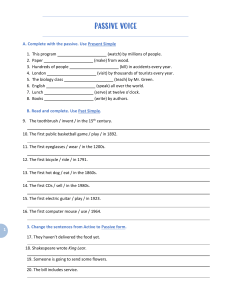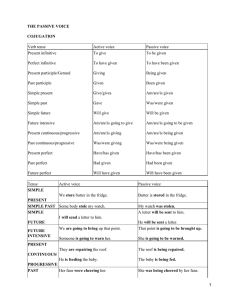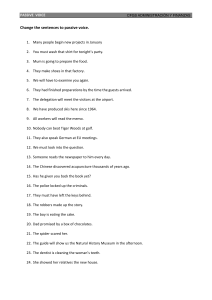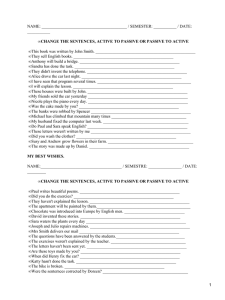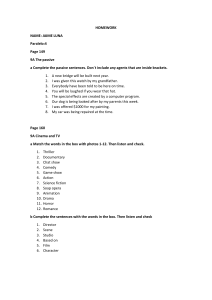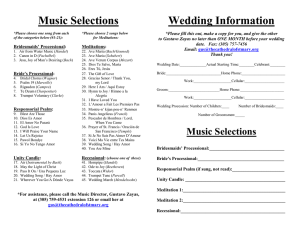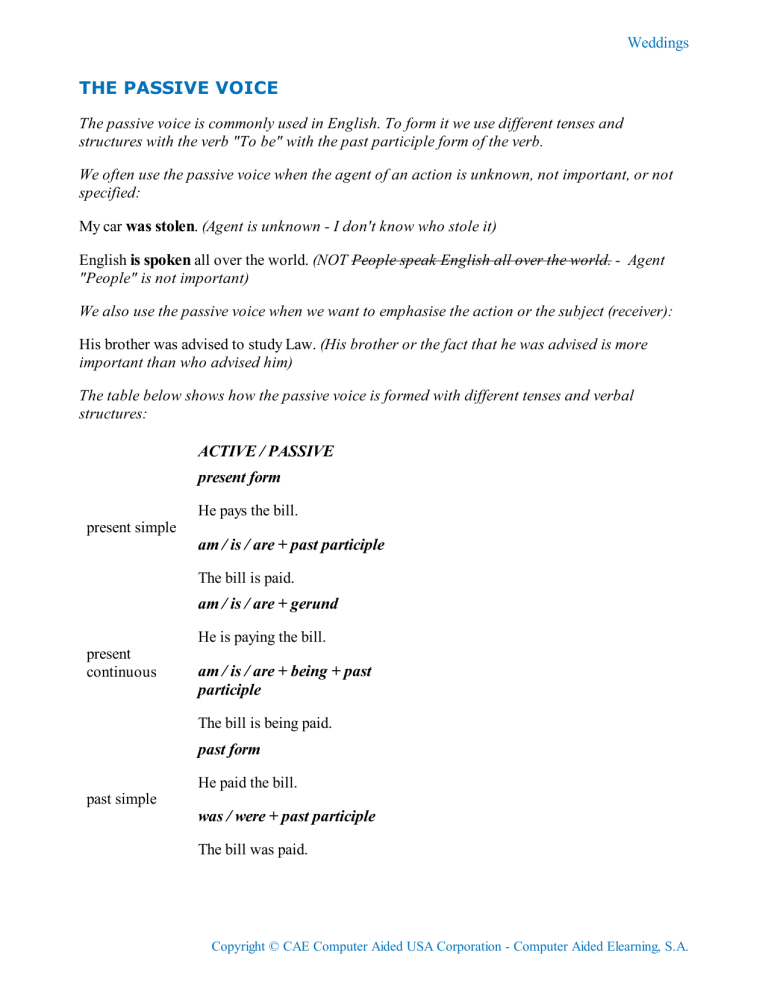
Weddings THE PASSIVE VOICE The passive voice is commonly used in English. To form it we use different tenses and structures with the verb "To be" with the past participle form of the verb. We often use the passive voice when the agent of an action is unknown, not important, or not specified: My car was stolen. (Agent is unknown - I don't know who stole it) English is spoken all over the world. (NOT People speak English all over the world. - Agent "People" is not important) We also use the passive voice when we want to emphasise the action or the subject (receiver): His brother was advised to study Law. (His brother or the fact that he was advised is more important than who advised him) The table below shows how the passive voice is formed with different tenses and verbal structures: ACTIVE / PASSIVE present form He pays the bill. present simple am / is / are + past participle The bill is paid. am / is / are + gerund He is paying the bill. present continuous am / is / are + being + past participle The bill is being paid. past form He paid the bill. past simple was / were + past participle The bill was paid. Copyright © CAE Computer Aided USA Corporation - Computer Aided Elearning, S.A. Weddings was / were + gerund He was paying the bill. past continuous was / were + being + past participle The bill was being paid. have / has + past participle He has paid the bill. present perfect have / has + been + past participle The bill has been paid. had + past participle He had paid the bill. past perfect had + been + past participle The bill had been paid. will + infinitive He will pay the bill. future simple will + be + participle The bill will be paid. be going to + infinitive He is going to pay the bill. be going to be going to + be + participle The bill is going to be paid. Copyright © CAE Computer Aided USA Corporation - Computer Aided Elearning, S.A. Weddings modal + infinitive He can pay the bill. He must pay the bill. He would pay the bill. modal verbs modal + be + participle The bill can be paid. The bill must be paid. The bill would be paid. Note: future progressive and perfect progressive tenses (e.g. "the bill will be being paid for or "the bill has been being paid for") in the passive voice are uncommon. The agent of a passive structure is introduced with the particle “by”. It's not necessary mention the agent, especially when the agent is obvious/implied, unknown, or unimportant. Compare: Romeo and Juliet was written in the sixteenth century. (Agent is not important) Romeo and Juliet was written by Shakespeare. (Agent is important) Verbs with two objects can also exist in the passive voice: They sent me the new catalogue. (active form) The new catalogue was sent to me. (passive form with direct object as subject) I was sent the new catalogue. (passive form with indirect object as subject) He is said to... When we want to express a general opinion or speculation of a group of people with verbs like say, believe, think, etc., it's common to use the passive voice: He is said to have a child. (People say he has a child) The prime minister is expected to arrive at lunchtime today. (People expect the prime minister to arrive at lunchtime today) Prepositions/phrasal verbs in the passive voice Prepositions tend to maintain their position after the verb: Copyright © CAE Computer Aided USA Corporation - Computer Aided Elearning, S.A. Weddings Will you read to me? I like being read to. Don’t shout at me! I hate being shouted at. Thanks for cooking for me. I appreciate being cooked for. Phrasal verbs generally maintain their particles after the verb too: Don’t worry, someone is looking after the children. Don’t worry, the children are being looked after. Subject questions The preposition “by”, which is used to indicate the agent in passive voice, can also appear at the end of subject questions (when the question word is also the subject): Who were The Canterbury Tales written by? The Canterbury Tales were written by G. Chaucer. Who was the radio invented by? The radio was invented by Marconi. Who was “Sunflowers” painted by? “Sunflowers” was painted by Vincent Van Gogh. Copyright © CAE Computer Aided USA Corporation - Computer Aided Elearning, S.A. Weddings ● LISTEN AND READ Read and listen to the following text. After that, you will be asked to answer a series of questions. 1 Weddings. In Britain there are two types of wedding: a civil wedding or a church wedding. In a civil wedding the ceremony takes place in the registry office and the bride and bridegroom are married by the registrar, a civil servant, who has the legal power to marry. There are two witnesses; usually close friends or relatives of the bride and bridegroom. A civil ceremony is usually for close family and friends and it is a small, simple affair. 2 Weddings. Church weddings are usually much bigger; many more people are invited. The bridegroom's guests sit on the right hand side and the bride's guests on the left. The best man, usually the bridegroom's best friend or brother, looks after the rings. The bridegroom and the best man wait in the church, and then the bride comes down the aisle, accompanied by her father. She has bridesmaids; these are female friends or relations of the bride, who walk along behind her and help to carry her dress. The ceremony is longer and includes readings, and in the Catholic Church, there is also communion. 3 Weddings. With both types of ceremony friends and relatives throw confetti at the newly married couple, and the bride throws her bouquet of flowers at the single, female guests. They say that the one who catches it is the next to be married. After the ceremony there is usually a reception, lunch or dinner for all the guests. The bride usually wears white and should wear four things for good luck: something old, something new, something borrowed, something blue. Copyright © CAE Computer Aided USA Corporation - Computer Aided Elearning, S.A. Weddings ● ANSWER "TRUE" OR "FALSE" Read the text again and decide if the statements are true or false. Example: The registrar goes to the church. False 1 Weddings. In Britain there are two types of wedding: a civil wedding or a church wedding. In a civil wedding the ceremony takes place in the registry office and the bride and bridegroom are married by the registrar, a civil servant, who has the legal power to marry. There are two witnesses; usually close friends or relatives of the bride and bridegroom. A civil ceremony is usually for close family and friends and it is a small, simple affair. Church weddings are usually much bigger; many more people are invited. The bridegroom's guests sit on the right hand side and the bride's guests on the left. The best man, usually the bridegroom's best friend or brother, looks after the rings. The bridegroom and the best man wait in the church, and then the bride comes down the aisle, accompanied by her father. She has bridesmaids; these are female friends or relations of the bride, who walk along behind her and help to carry her dress. The ceremony is longer and includes readings, and in the Catholic Church, there is also communion. With both types of ceremony friends and relatives throw confetti at the newly married couple, and the bride throws her bouquet of flowers at the single, female guests. They say that the one who catches it is the next to be married. After the ceremony there is usually a reception, lunch or dinner for all the guests. The bride usually wears white and should wear four things for good luck: something old, something new, something borrowed, something blue. 2 The registrar goes to the church. True False 3 A civil wedding takes place at a registry office. True False Copyright © CAE Computer Aided USA Corporation - Computer Aided Elearning, S.A. Weddings 4 The bridegroom's guests sit on the left-hand side. True False 5 Church weddings are usually bigger than civil weddings. True False 6 The bridegroom arrives at the church before the bride. True False 7 The bride's father walks down the aisle with the bride. True False 8 There is a reception after the ceremony. True False 9 The bride wears five things for good luck. True False 10 Friends and relatives throw potatoes at the couple. True False Copyright © CAE Computer Aided USA Corporation - Computer Aided Elearning, S.A. Weddings 11 The bride throws the bouquet at the single women. True False ● THE PASSIVE: EXERCISE Rewrite the following sentences using the passive voice. Make sure not to change the meaning. Example: God made the world in seven days. The world was made in seven days. 1 Shakespeare wrote Macbeth in about three years. . 2 Someone sent the letter. . 3 The Briggs invited us to dinner. . 4 Someone sold the painting for a million dollars. . 5 Someone gave the hospital a thousand dollars. . 6 Someone found a rare coin on the beach. . 7 They don't use their summer house very often. . Copyright © CAE Computer Aided USA Corporation - Computer Aided Elearning, S.A. Weddings 8 The teacher took the class to the theatre. . 9 When did someone build this bridge? ? 10 How do you spell this word? ? Copyright © CAE Computer Aided USA Corporation - Computer Aided Elearning, S.A.

